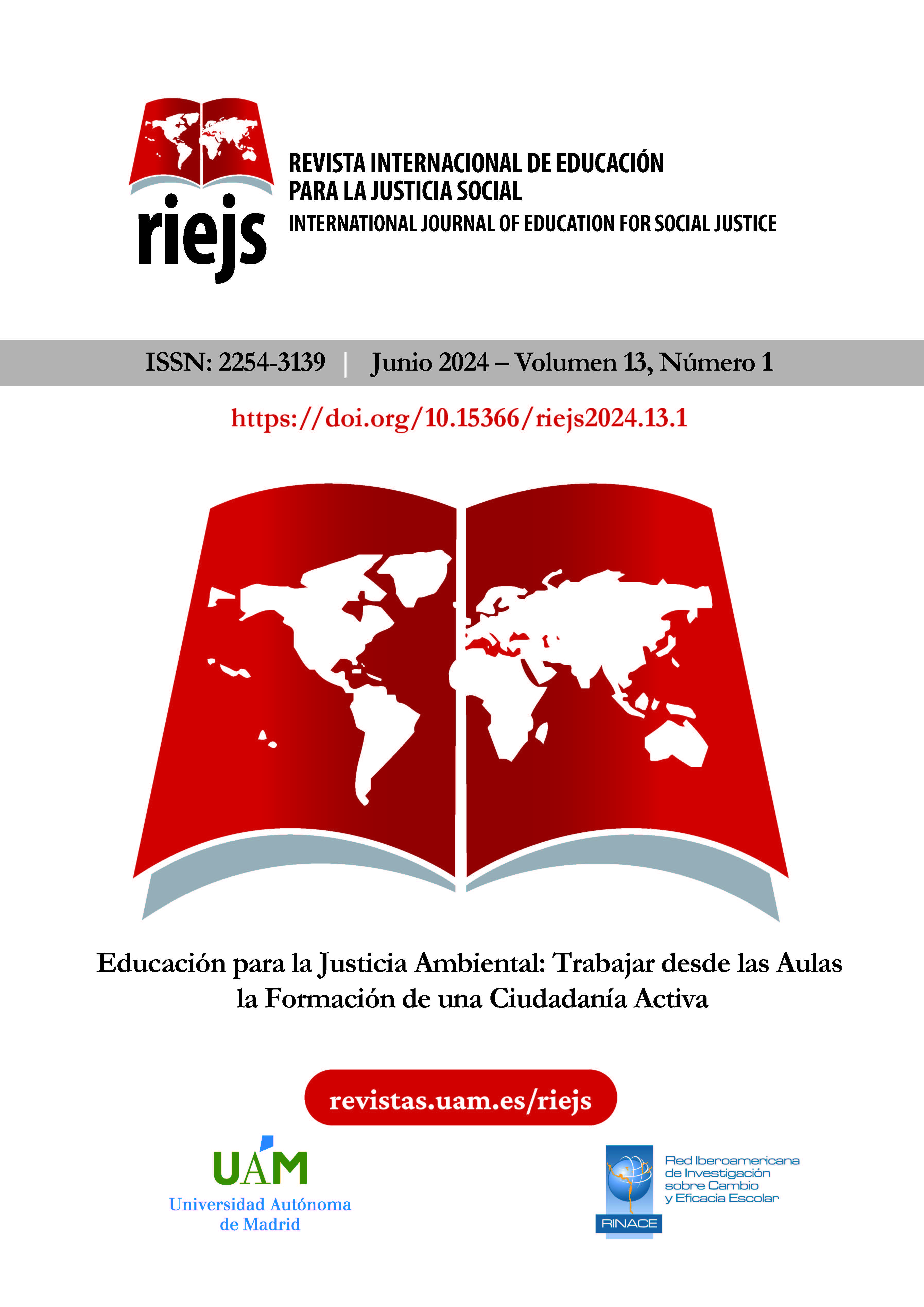Implementation of the 2030 Agenda: Didactic Proposal that Uses Sustainable Development Goals to Enhance Social and Intercultural Competences in English Teaching
Keywords:
Sustainable development goals, Cooperative learning, Intercultural competence, Social awareness, Higher education, Teaching-learning
This work is licensed under a Creative Commons Attribution-NonCommercial-NoDerivatives 4.0 International License.
Abstract
This study offers a didactic application of the 2030 agenda by presenting a proposal of activities used in the teaching of English as a foreign language in which Sustainable Development Goals (SDGs) 1, 10 and 12 are used to work with global issues that favor the development of intercultural competence and some social skills in a subject of the degree in English Studies. The main objective is to observe the suitability of the implementation of activities framed in the SDGs in university education to provide the English teaching with social content. The methodology is mixed by offering qualitative data based on the teacher's observation and quantitative data by presenting the results of a survey and a rubric used to assess competencies. The results show that this study enhances an intercultural and social competency-based curriculum in order for students to develop social awareness. As conclusions, the study reveals that the SDGs worked on in the activities contribute to enhancing the acquisition of intercultural and social skills. This favors the development of students' social awareness by becoming aware of different social realities and offering opportunities to respect cultural differences
Downloads
References
Acosta Torres, R. y Aguilar Balderas, J. C. (2018). Educar para la sostenibilidad. La función de la universidad en el cumplimiento de la agenda 2030. Arlequín.
Baesler, J. E. y Lauricella, S. (2014). Teach peace: Assessing instruction of the nonviolent communication and peace course. Journal of Peace Education, 11(1), 46-63. https://doi.org/10.1080/17400201.2013.777899
Bisquerra Alzina, R. y Pérez Escoda, N. (2007). Las competencias emocionales. Educación XXI, 10, 61-82. https://doi.org/10.5944/educxx1.1.10.297
Brooks, D. E. y Hébert, L. P. (2006). Gender, race, and media representation. En B. J. Dow y J. T. Wood (Eds.), The sage handbook of gender and communication (pp. 297-317). Sage Publications. https://doi.org/10.4135/9781412976053.n16
Byram, M. (2000). Assessing intercultural competence in language teaching. Sprogforum, 18(6), 8-13.
Byram, M. (2009). Evaluation and/or assessment of intercultural competence. En A. Hu y M. Byram (Eds.), Intercultural competence and foreign language learning. Models, empiricism and assessment (pp. 215–234). Narr Francke Attempto Verlag.
Clouet, R. (2013). Understanding and assessing intercultural competence in an online environment: A case study of transnational education programme delivery between college students in ULPGC, Spain, and ICES, Francde. RESLA, 26, 139-157. https://accedacris.ulpgc.es/handle/10553/45411
Cuartas Álvarez, L. F. (2020). Intercultural communicative competence: In-service EFL teachers building understanding through study groups. Profile: Issues in Teachers’ Professional Development, 22(1), 75-92. https://doi.org/10.15446/profile.v22n1.76796
Espinoza-Freire, E. (2020). Estrategia metodológica para la interculturalidad en la formación docente. Universidad y Sociedad, 12(2), 369-379.
Espinoza-Freire, E., Herrera-Montero, L. A., y Castellano-Gil, J. M. (2019). La dimensión intercultural en la formación docente en Ecuador. Psychology, Society, & Education, 11(3), 341-354. https://doi.org/10.25115/psye.v11i3.2253
Girik Allo, M. D. (2018). Intercultural communication in EFL classrooms. Ethical Lingua, 5(2), 159-170. https://doi.org/10.30605/ethicallingua.v5i2.1036
Güne?, G. y Mede, E. (2019). Integration of intercultural communicative competence (ICC) in an EFL course: Perceptions of students and teachers. Inonu University Journal of the Faculty of Education, 20(2), 352-363. https://doi.org/10.17679/inuefd.445793
Krainer, A. y Guerra, M. (2016). Interculturalidad y educación. Desafíos docentes. FLACSO.
Kress, G. y van Leeuwen, T. (2021). Reading images: The grammar of visual design. Routledge Press. https://doi.org/10.4324/9780203619728
López-Roldán, P. y Fachelli, S. (2015). La encuesta. En P. López-Roldán y S. Fachelli (Eds.), Metodología de la investigación social cuantitativa (pp. 5-35). Universidad Autónoma de Barcelona.
Londoño-López, M. C. (2018). Retos y desafíos de las políticas públicas para la igualdad de género y los derechos humanos, en el marco de la agenda 2030 y los objetivos de desarrollo sostenible. Prospectiva, 25, 13-28. https://doi.org/10.25100/prts.v0i25.6004
Lucio-Villegas, E. (2015). Paulo Freire. La educación como instrumento para la justicia social. Revista Internacional de Educación para la Justicia Social, 4(1), 9-20. https://doi.org/10.15366/riejs2015.4.1.001
Martínez Lirola, M. (2019). Una propuesta didáctica para introducir la educación para la ciudadanía global en la enseñanza universitaria. Revista Electrónica Educare, 23(2), 1-20. https://doi.org/10.15359/ree.23-2.15
Martínez Lirola, M. (2022). Propuesta didáctica enmarcada en la educación con perspectiva de género en la enseñanza universitaria. Encuentro, 30, 3-22. https://doi.org/10.37536/ej.2022.30.1929
Medir Huerta, R. M., Heras Colás, R. y Magin Valentí, C. (2016). Una propuesta evaluativa para actividades de educación ambiental para la sostenibilidad. Educación XX1, 19(1), 331-355. https://doi.org/10.5944/educxx1.15589
Moliní Fernández, F. y Sánchez-González, D. (2019). Fomentar la participación en clase de los estudiantes universitarios y evaluarla. Revista de Docencia Universitaria, 17(1), 211-227. https://doi.org/10.4995/redu.2019.10702
Naciones Unidas, Asamblea General (12 de agosto de 2015). Proyecto de documento final de la cumbre de las Naciones Unidas para la aprobación de la agenda para el desarrollo después de 2015. Naciones Unidas.
Priegue Caamaño, D. y Leiva Olivencia, J. J. (2012). Las competencias interculturales en la sociedad del conocimiento: Reflexiones y análisis pedagógico. EDUTEC, Revista Electrónica de Tecnología Educativa, 40, 1-12. https://doi.org/10.21556/edutec.2012.40.370
Rodríguez Cruz, M. (2018). Construir la interculturalidad. Políticas educativas, diversidad cultural y desigualdad en Ecuador. Íconos, Revista de Ciencias Sciales, 60, 217-236. https://doi.org/10.17141/iconos.60.2018.2922
Ruiz de la Torre, G., Gómez Gómez, K. y Ruiz Ávalos, F. G. (2016). La dimensión del desarrollo sostenible en la creación de nueva oferta educativa para la Universidad Pedagógica Nacional. Uaricha, Revista de Psicología, 13(30), 225-251.
Tallón, R. y Sikora, M. (2011). Conciencia en acción. Eneagrama, inteligencia emocional y cambio. Gulaab.
Uribe Pérez, M. y Mosquera, C. J. (2016). La formación del profesorado desde el enfoque intercultural. Una aproximación a su estado actual. Revista Tecné, Episteme y Didaxis, Extra, 1698-1704.
Vinagre, M. (2014). El desarrollo de la competencia intercultural en los intercambios telecolaborativos. Revista de Educación a Distancia, 41, 1-22.

